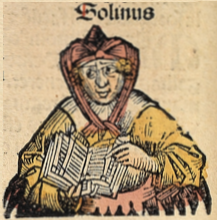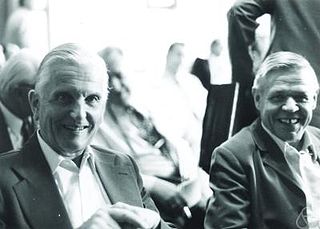Related Research Articles

Gaius Julius Solinus, better known simply as Solinus, was a Latin grammarian, geographer, and compiler who probably flourished in the early 3rd century AD. Historical scholar Theodor Mommsen dates him to the middle of the 3rd century.
Quintus Fabius Pictor was the earliest known Roman historian. His history, written in Greek and now mostly lost besides some surviving fragments, was highly influential on ancient writers and certainly participated in introducing Greek historiographical methods to the Roman world. However, the work was highly partisan towards Rome, blaming the Second Punic War on Carthage and idealizing the Roman Republic as a well-ordered state loyal to its allies. Fabius probably served as praetor, was a member of the Senate, and participated in a delegation sent to the oracle at Delphi in 216 BC. Some scholars consider him one of the earliest annalists, although this conclusion has been criticized.
Annalists, were a class of writers on Roman history, the period of whose literary activity lasted from the time of the Second Punic War to that of Sulla. They wrote the history of Rome from the earliest times down to their own days, the events of which were treated in much greater detail. Annalists were different from historians, in that an annalist was more likely to just record events for reference purposes, rather than offering their own opinions of events. There is, however, some overlap between the two categories and sometimes annalist is used to refer to both styles of writing from the Roman era.
Ulrich Willerding was a professor of botany at the Göttingen University, Germany. He was also an instructor at a local high school. Willerding was one of the leading European palaeo-ethnobotanists. He had specialized in Medieval Europe but also done work on other times. One of his special interests was weeds. He had worked on bibliographies of European paleoethnobotany. Although a biologist by training, he had worked extensively with archaeologists.
Jochen Bleicken was a German professor of ancient history.
Walter Friedrich Gustav Hermann Otto was a German classical philologist particularly known for his work on the meaning and legacy of Greek religion and mythology, especially as represented in his seminal 1929 work The Homeric Gods.
Joseph Vogt was a German classical historian, one of the leading 20th-century experts on Roman history.

Gnaeus Gellius was a Roman historian. Very little is known about his life and work, which has only survived in scattered fragments. He continued the historical tradition set by Fabius Pictor of writing a year-by-year history of Rome from mythological times to his day. However, with about a hundred books, Gellius' Annales were massively more developed than the other Roman annalists, and was only surpassed by Livy's gigantic History of Rome.

Paul Fritz Helmuth Gericke (1909–2007) was a German mathematician and a historian of mathematics.
The Ewiger Landfriede of 1495, passed by Maximilian I, German king and emperor of the Holy Roman Empire, was the definitive and everlasting ban on the medieval right of vendetta (Fehderecht). In fact, despite being officially outlawed, feuds continued in the territory of the empire until well into the 16th century.
Hans Beck is a German and Canadian scholar in the field of Classical Studies.
Hartwin Brandt is a German ancient historian.

Lorenz Hubert Weinrich is a German historian.
Werner Huß was a German ancient historian.

Henner von Hesberg is a German classical archaeologist.
Johannes Kromayer was a German classical historian. He was an older brother of dermatologist Ernst Kromayer (1862–1933).
Rudolf Vierhaus was a German historian who mainly researched the Early modern period. He had been a professor at the newly founded Ruhr University Bochum since 1964. From 1971, he was director of the Max-Planck-Institut für Geschichte in Göttingen. He became known for his research on the Age of Enlightenment.
Friedrich Cornelius was a German historian who specialized in ancient history.
Günther Binding is a German art historian and retired professor of art history and urban conservation at the University of Cologne.
Heinz Heinen was a German-Belgian historian of classical antiquity. He was a professor of ancient history at the University of Trier from 1971 to 2006. Heinen's main research areas were Hellenistic Egypt and Roman Egypt, Augusta Treverorum in the Roman era, Crimea in the Roman era and the wider northern Black Sea region, Soviet and Russian historiography and views of antiquity, and slavery in antiquity.
References
- ↑ reviewed by Peter Kritzinger at H-Soz-u-Kult